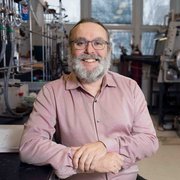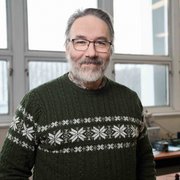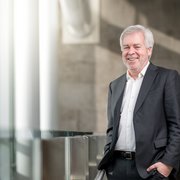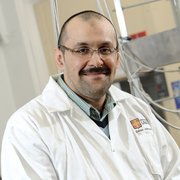Faculty researchers are using their brain power to help industry go greener through research on sustainable development, How? By reprocessing mine tailings, finding ways to recover waste heat from aluminum smelters to improve energy efficiency, and using green chemistry to reduce pollution in industrial processes by creating low-toxic catalysts. Other researchers are working on the conversion of organic waste from municipalities, the development of clean energy sources such as hydro turbines, and the use of smart power grids to drive transportation electrification.
Explore research on energy and sustainable development
The faces of energy and sustainable development research
Green chemistry
Green chemistry refers to the development of chemicals and processes that use and produce few or no hazardous materials. The 12 basic principles of green chemistry include waste prevention, atom economy, less hazardous chemical syntheses, energy efficiency, reducing derivatives, and catalysis. Catalysis is central to green chemistry because it makes chemical reactions cleaner and more energy efficient, especially environmental catalysis which draws on plant-based molecules.
- Centre for Green Chemistry and Catalysis (C3V)
- Centre for Advanced Materials Research (CERMA)
- Canada Research Chair in Green Catalysis and Metal-Free Processes
- Canada Research Chair in Electroactive and Photoactive Polymers
- Institut Hydro-Québec en environnement, développement et société (Institut EDS)

Frédéric-Georges Fontaine, professeur titulaire, Department of Chemistry
Canada Research Chair in Green Catalysis and Metal-Free Processes
Frédéric-Georges Fontaine and his team are working to replace inorganic catalysts with inexpensive, low-toxicity organic alternatives. They are designing custom molecular architectures with unique properties using computational predictions, their expertise in metal chemistry—and their own intuition. These new green catalysis methods aim to reduce pollution in specific industrial processes.
Energy efficiency
Energy efficiency can be divided into three areas: energy savings, consumption management, and energy use. Energy savings require efficient production and use of energy. Various technological solutions can be implemented to achieve this, including energy-efficient windows, geothermal systems for extracting heat and cold from the ground to heat and cool buildings, solar water heaters, and compact florescent light bulbs.

Louis Gosselin, professeur titulaire, Department of Mechanical Engineering
Member of the Aluminum Research Centre and collaborator on the NSERC/Alcoa/Hydro-Québec Industrial Research Chair on Energy Efficiency and the Advanced Modeling of Aluminum Electrolysis Cells
Professor Gosselin specializes in energy efficiency, thermal transfer in buildings, and geothermal systems for the industrial sector. He is the lead researcher on a project to recover waste heat from aluminum smelters in order to improve energy efficiency and reduce greenhouse gas emissions. He is also involved in a project that aims to measure the availability of natural light and its impact on energy demand for buildings in Inuit communities as part of the Sentinel North research program.
Transportation electrification
Transportation electrification involves four key components: energy storage, charging infrastructure, electricity distribution infrastructure, and electric motorization. Technology in the field is advancing rapidly, from batteries (e.g., lithium-ion) and low-cost, high performance electric motors to next-generation electric powertrains. Major progress is being made on distribution networks and new infrastructure will incorporate smart charging concepts and bidirectional charging.

Jérôme Cros, professeur titulaire, Department of Electrical and Computer Engineering
Member of the Laboratoire d'électrotechnique, électronique de puissance et commande industrielle (LEEPCI)
Professor Cros specializes in designing, modelling, and diagnosing electric motors for all types of vehicles (bicycles, scooters, cars, trains, planes, etc.) More specifically, he works on electric motor-inverters for variable-speed drives. The motor-inverters can be used as traction and propulsion systems and to convert renewable energy into electricity.
We work hard together in a mutually supportive and respectful environment that encourages teamwork. Each individual contribution takes the team further [...] It’s a privilege to work with exceptionally talented scientists who have deep-seated human values.
Jean-Rémi Pouliot, PhD student in chemistry, on his experiences in the lab run by his supervisor,Professor Mario Leclerc
Graduate studies
Make the leap to graduate studies
Explore our fields of study
Renewable energies
Renewable energy is derived from natural sources that are replenished as fast or faster than they are consumed. It includes solar, geothermal, wind, hydroelectric, and ocean energy, and also bioenergy from biomass, biogas, and liquid biofuel. Wind and solar energy are the fastest-growing forms of renewable energy in Canada at the moment. The success of efforts to transition to these energies in order to reduce our dependency on traditional energies hinges in part on technological innovations, both in terms of improving the materials used and the production capacity of equipment.

Mario Leclerc, professeur titulaire, Department of Chemistry
Canada Research Chair in Electroactive and Photoactive Polymers
Professor Leclerc has developed semiconductor polymers that conduct light and electricity and have applications in organic electronics, including solar cells, light-emitting diodes, and computer chips. These new materials can effectively replace silicon, which is expensive and produces significant pollution during manufacturing. Since making this discovery, he has worked on developing photovoltaic cells (the basic components of solar panels) using conjugated polymers that have high energy conversion efficiency and a lifespan of over ten years.
Resource recovery and conversion
Responsible resource management and the gradual greening of industrial processes are driving many researchers to seek ways to reuse municipal waste and waste from the mining, forestry, and oil and gas industries. By converting waste into value-added products, these researchers are advancing green development, which has positive impacts on employment, the environment, and public health.

Faïçal Larachi, professeur titulaire, Department of Chemical Engineering
Professor Larachi specializes in energy processes used to reclaim mining and biomass waste. One of his projects involves recovering the apatite found in mining industry waste to develop a concentrate that can be sold to fertilizer plants. He is also developing decarbonization processes and new approaches for sequestering greenhouse gas.
Research has an artistic and creative dimension. [...] You have to leave room for luck and a bit of intuition.
Mario Leclerc, professor, Department of Chemistry and Canada Research Chair in Electroactive and Photoactive Polymers
